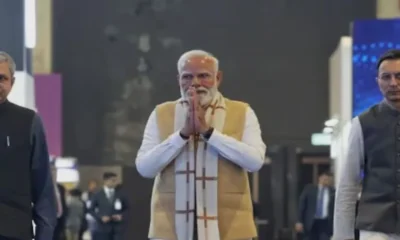India and France on Saturday inked 14 key agreements in the strategic areas of security, nuclear energy, and protection of classified information, as companies from the two countries signed contracts worth Rs 1,04,000 crore, said media reports.
The agreements, which include sectors like education, environment, urban development and railways, were signed after extensive bilateral talks between Prime Minister Narendra Modi and French President Emmanuel Macron in New Delhi on Saturday.
Addressing a joint press conference after the talks with President Macron, PM Modi said the two countries have robust cooperation in the fields of defence and security.
“Our strategic partnership may be just 20 years old, but our cultural and spiritual partnership is much older. The values of liberty, equality and fraternity echo not just in France but have been embedded in India’s Constitution as well,” said PM Modi.
For his part, Macron said India and France have decided to work together to deal with threats of terrorism and radicalisation.
Defence cooperation between the two countries now has a new significance, he said. “We want India as our first strategic partner here, and we want to be India’s first strategic partner in Europe, and even the western world,” the French president said.
Both the leaders also talked about cooperation in the Indo-Pacific region.
The deals signed by companies from the two countries include a contract for France’s Safran to supply airline SpiceJet with engines, water system modernisation by Suez in the southern city of Davangere and a contract between industrial gas company Air Liquide and Sterlite, the French presidency said in a statement, according to media reports.
Macron’s office did not provide a breakdown of the contracts’ values or details about the deals. It said some €200 million (over Rs.160 crore) of investments will be made in India.
A so-called “Industrial Way Forward Agreement” was signed between French utility EDF and India’s NPCIL for the construction of six nuclear reactors at Jaitapur. Negotiations over the construction of next-generation nuclear reactors in India have been dragging on for years.
It was not immediately clear whether these were firm contracts or letters of intent.
The bilateral trade between India and France from April 2016 to March 2017 reached 10.95 billion dollars. France is the ninth largest foreign investor in India with a cumulative investment of over six billion dollars from April 2000 to October 2017.
Macron, who arrived in India on Friday night on a four-day visit was received at the airport on Friday night by PM Modi, in a special gesture. He was given a ceremonial welcome this morning. This is Macron’s first visit to India after he assumed office in May in 2017.
“Another chapter in the glorious book of our friendship! PM Narendra Modi welcomes President of France Emmanuel Macron at the Hyderabad House in New Delhi ahead of the bilateral talks,” MEA spokesperson Raveesh Kumar tweeted along with pictures of the two leaders.
The visiting leader also met President Ram Nath Kovind and Minister of External Affairs (MEA) Sushma Swaraj.
Speaking to media after being accorded a ceremonial reception at the Rashtrapati Bhavan, Macron said he has three purposes for this visit.
He said the first one is to open a new era in the India-France Strategic Partnership “in terms of defence and security, in terms of research and science, especially in terms of our youth, higher education and science”.
“It is absolutely critical because our two democracies have common challenges regarding terrorism, a lot of common risks, a lot of threats,” Macron said.
“The second purpose of this trip is to organise this International Solar Alliance (conference),” he said.
“The third objective of this visit is to deliver the message that France should be the best partner for India, especially in Europe, the entry point for Europe. And I aim to have more and more Indian citizens coming to France studying, becoming a partner, creating start-ups and I want my country to be your best partner in Europe.”
On Sunday, Modi and Macron will co-chair the founding conference of the India-initiated International Solar Alliance (ISA), which was launched by Modi and then French President Francois Hollande during the Paris Climate Summit in 2015.
The ISA is conceived as a coalition of solar resource-rich countries to address their special energy needs and provide a platform to collaborate on dealing with the identified gaps through a common, agreed approach. It is open to all 121 prospective member countries falling between the tropics of Cancer and Capricorn. Sunday’s conference will be attended by 23 of those who have submitted the instruments of ratification and 24 of those who have signed the framework agreement.
On his India tour, Macron will also visit Agra and Varanasi and have a town hall interaction with students in New Delhi. During his visit to Varanasi on Monday, he will inaugurate a 75 MW solar plant built by French firm Engie Solar in Mirzapur in Uttar Pradesh.


 Latest world news21 hours ago
Latest world news21 hours ago
 Latest world news21 hours ago
Latest world news21 hours ago
 India News21 hours ago
India News21 hours ago
 Latest world news12 hours ago
Latest world news12 hours ago














